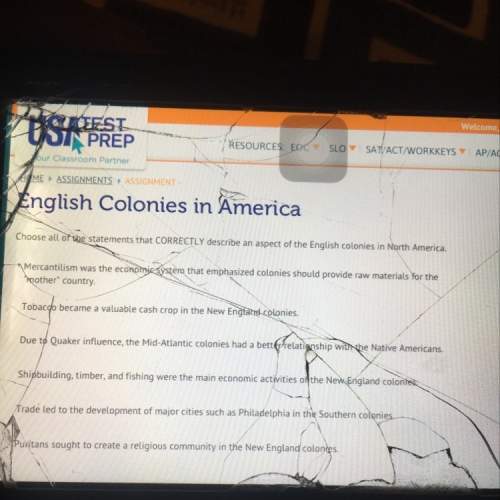
Which of the following was not one of the major arguments used to support
anti-imperialism in the late 19th and early 20th centuries?
A. Imperialism would require large standing armies and entangle the
United States in foreign alliances.
B. Imperialism is immoral and contradicts America's commitment to
human freedom.
C. U. S. corporations would suffer if countries with their own
industries became American territories.
D. Domestic workers might be undercut by an influx of cheap labor
from the new colonies.

Answers: 2


Another question on History

History, 21.06.2019 22:30
Which of the following best describes the relationship between the united states and south korea today?
Answers: 1

History, 21.06.2019 23:30
What was the difference between bombing military targets in the united kingdom, and bombing the city of london? a. bombing a city kills lots of innocent civilians, bombing a military target doesn't b. bombing military targets didn't force the u.k. to surrender, but bombing london did c. military targets were bombed by japan, while london was bombed by the nazis d. london was bombed before the u.s. entered the war; military targets were bombed afterward
Answers: 2

History, 22.06.2019 01:30
Which of these is a role of congress? a) to veto legislation b) to pass the federal budget c) to nominate cabinet members d) to interpret the constitution 2) which of these is a power of the legislative branch? a) declare war b) enforces laws c) interprets laws d) negotiates treaties 3) a two/thirds vote of each house of congress is required to a) impeach the u.s. president. b) approve presidential appointments. c) pass an appropriation or tax bill. d) pass a bill over the president's veto. 4) the chief purpose of congressional committees is to a) draft legislation for consideration by the full congress. b) act as a group to which the president can direct his lobbying effort. c) provide a place for lobbyists and special interest groups to get support. d) hold hearings so that bills can be evaluated and studied prior to voting. 5) after a bill has been passed by both houses of congress it a) becomes a law. b) is sent to the president. c) returns to the house of origin for verification. d) is sent to a subcommittee in the house or senate. 6) house of representatives passes a spending bill → senate debates the spending bill → senate passes the spending bill → ? what completes this sequence of events? a) the spending bill becomes a law b) the states must approve the bill c) the supreme court reviews the bill d) the president must act on the bill eliminate
Answers: 1

You know the right answer?
Which of the following was not one of the major arguments used to support
anti-imperialism in the l...
Questions

Arts, 28.01.2020 22:04



Mathematics, 28.01.2020 22:04

Mathematics, 28.01.2020 22:04

Mathematics, 28.01.2020 22:05

English, 28.01.2020 22:05





Mathematics, 28.01.2020 22:05

History, 28.01.2020 22:05

Mathematics, 28.01.2020 22:05





Biology, 28.01.2020 22:05

History, 28.01.2020 22:05




